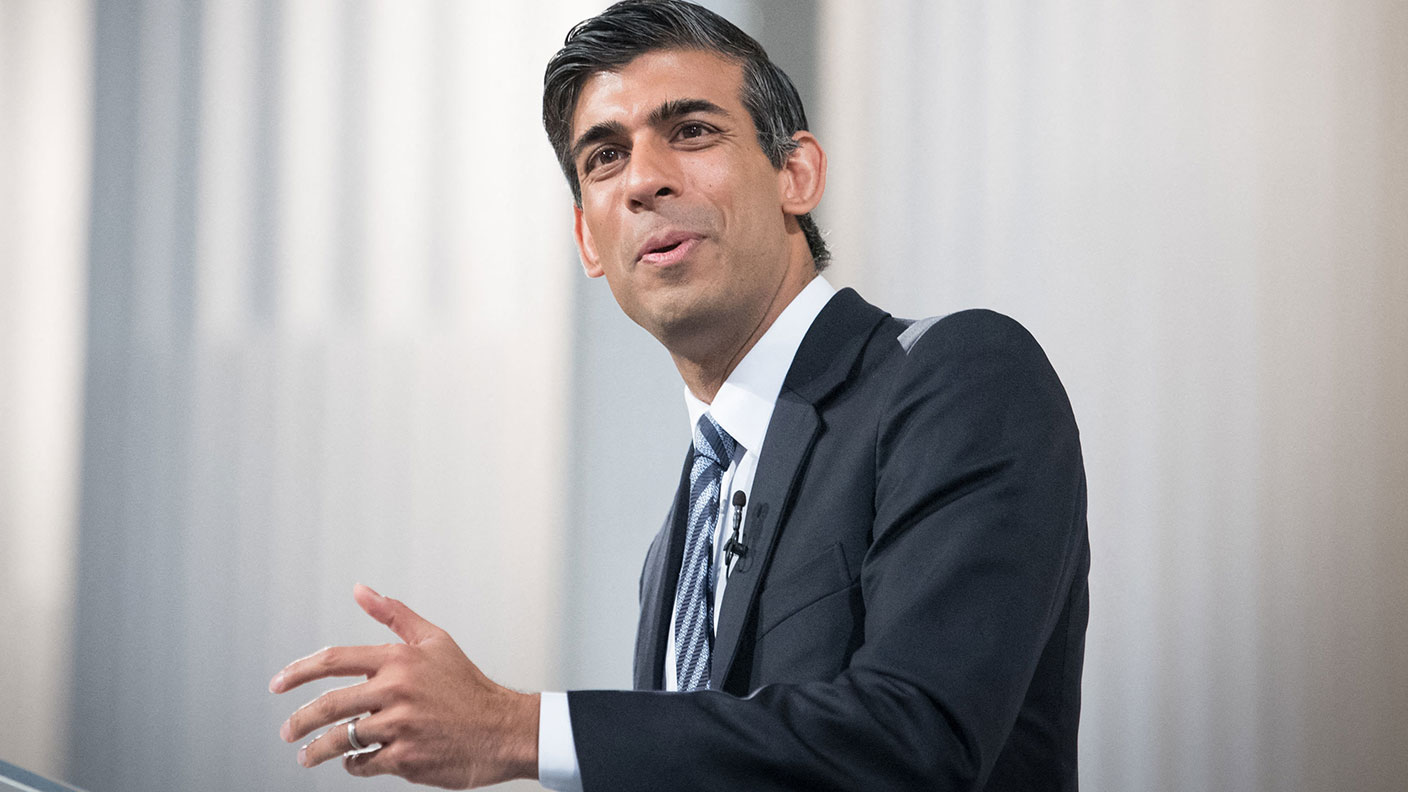Britain's current-account deficit: the deficit that nobody’s talking about
Politicians are obsessed with the UK’s budget deficit, but our current-account deficit is the largest since the 1940s. Could Brexit turn it into a crisis? Simon Wilson reports.
Get the latest financial news, insights and expert analysis from our award-winning MoneyWeek team, to help you understand what really matters when it comes to your finances.
You are now subscribed
Your newsletter sign-up was successful
Want to add more newsletters?

Twice daily
MoneyWeek
Get the latest financial news, insights and expert analysis from our award-winning MoneyWeek team, to help you understand what really matters when it comes to your finances.

Four times a week
Look After My Bills
Sign up to our free money-saving newsletter, filled with the latest news and expert advice to help you find the best tips and deals for managing your bills. Start saving today!

What is the current-account deficit?
A nation's current account is an overall measure of whether that country is a net lender to the rest of the world, or a net borrower from it. When the account is in deficit, it means it's a net borrower, which has been the situation for the UK for more than 30 years.
The current-account measure consists of three elements. First, there's the trade balance: the total value of exports (of both goods and services) minus imports. Second is net transfers, for example remittances sent abroad or home by migrant workers, or international development spending. And the third part is net investment income the difference between the money that the UK earns on overseas investments and what it pays out to investors overseas.
Why does it matter?
The current-account deficit was for many years a closely watched barometer that dominated domestic politics. In 1970, for example, Prime Minister Harold Wilson famously appeared to be heading for another election victory when unexpectedly bad trade figures changed the course of the campaign and allowed Edward Heath into Downing Street.
MoneyWeek
Subscribe to MoneyWeek today and get your first six magazine issues absolutely FREE

Sign up to Money Morning
Don't miss the latest investment and personal finances news, market analysis, plus money-saving tips with our free twice-daily newsletter
Don't miss the latest investment and personal finances news, market analysis, plus money-saving tips with our free twice-daily newsletter
However, today it's principally the UK's fiscal deficit the gap between tax revenues and government spending that makes news headlines (the Conservative government's stated aim is to turn the deficit into a surplus by 2019-2020). But some argue that the current-account deficit should be watched much more closely than it is especially given the vote in favour of the UK leaving the EU.
Why is that?
Because it's become so large, hitting a post-war high of 7% of GDP in the last quarter of 2015. (The figure for the whole of 2015 was £96.2bn, or 5.2% of GDP.) A current account is not a bad thing in itself, and nor is a current-account surplus.
For example, says Oliver Kamm in The Times, countries that are developing rapidly often run current-account deficits. This is natural for an economy that has many investment opportunities and not enough domestic savings to take advantage of them. Foreign investors can provide the capital, and the inflow of funds means a widening current-account deficit.
So it's good news for the UK?
No. A large and persistent deficit can signal an economy with strong domestic consumption that's not paying its way in the world, while a large surplus can signal a country where domestic demand is too weak and growth is too reliant on exports. In the case of Britain, the deficit could in one sense be seen as a vote of confidence in its ability to balance the current deficit with a capital surplus. After all, a country can sustain higher borrowing if its investments are growing. However, that's not been the case in recent years: on the contrary, Britain's net investment income has fallen.
As Duncan Weldon, head of research at investment firm Resolution Group, puts it: "For advanced economies like the UK, current-account deficits have a habit of not really mattering until such a time as investors decide they do matter. At which point they can matter a great deal".
How is this linked to Brexit?
Some analysts believe that the vote to leave the EU could be exactly the kind of negative shock that could precipitate a crisis of confidence in the UK economy. If investors in Britain were collectively to lose their nerve, there could be a sudden halt in capital inflows, forcing the current account into a balance of payments crisis. In a fixed exchange rate or common currency system, the result is a wrenching economic adjustment of the kind we have seen in several eurozone countries in recent years.
For a country with a floating currency, such as the UK, it has the potential to cause a disastrous depreciation of the currency (in which any gains for exporters are wiped out by the overall recessionary impact) and widespread default on debt.
Are there reasons to be cheerful?
Thankfully, yes. In the case of the UK, it's not a widening trade deficit that has been the biggest factor in the current-account deficit, but a collapse in net investment income. That is potentially reassuring. The fact that the UK is earning less on its external investments than it is paying to foreign investors in the country and that the gap is increasing could be seen as a function of the fact that the UK economy is in generally better shape than most.
Could the deficit be good news?
The stability of the UK's structural trade deficit (at around 2% of GDP) is arguably an encouraging sign especially now. The next government, which must negotiate the terms of Britain's future relationship with the EU, will no doubt be armed with the latest figures showing that Britain had a £34.7bn deficit in the trade of goods in the first three months of 2016, up by £1.4bn on the final quarter of 2015.
Crucially, the deficit with the EU accounted for more than two thirds of the shortfall, around £24bn. That's an awful lot of net exports that other EU countries have no wish to put at risk.
Is overreacting the real risk?
Of course, there are risks to running a current-accountdeficit, says Frances Coppola on FT.com. "All that inwardinvestment has to go somewhere: we would like to thinkthat it would go into productive business investment,but it could go to blow up property prices in London andEdinburgh." A widening external deficit "also makesit harder to close the fiscal deficit, since the domesticprivate sector (households and/or companies) must runlarger deficits to compensate".
However, there is a simplesolution to this: stop trying so hard to close the fiscaldeficit. The fiscal deficit "has never been the biggest riskto the economy, and the current-account deficit isn't either.The biggest risk is that fear of these deficits will lead topolicy decisions that squash a promising recovery".
Get the latest financial news, insights and expert analysis from our award-winning MoneyWeek team, to help you understand what really matters when it comes to your finances.
-
 Early signs of the AI apocalypse?
Early signs of the AI apocalypse?Uncertainty is rife as investors question what the impact of AI will be.
-
 Reach for the stars to boost Britain's space industry
Reach for the stars to boost Britain's space industryopinion We can’t afford to neglect Britain's space industry. Unfortunately, the government is taking completely the wrong approach, says Matthew Lynn
-
 State pension triple lock at risk as cost balloons
State pension triple lock at risk as cost balloonsThe cost of the state pension triple lock could be far higher than expected due to record wage growth. Will the government keep the policy in place in 2024?
-
 Will IHT be cut?
Will IHT be cut?News Sunak could make cuts to Inheritance Tax cuts later this year, reports suggest. We explain what this could mean for you.
-
 Triple lock to stay: how will it affect your pension?
Triple lock to stay: how will it affect your pension?Analysis Triple lock looks set to stay, but what it is and what does it mean for your retirement income?
-
 Rishi Sunak's £50bn problem - why taxes could go up
Rishi Sunak's £50bn problem - why taxes could go upAnalysis New PM Rishi Sunak is facing the daunting task of sorting out the UK economy. Here we look at what his appointment could mean for your money.
-
 What the rise in National Insurance contributions means for you
What the rise in National Insurance contributions means for youBriefings National Insurance contributions are due to increase from 6 April. Saloni Sardana explains the reasons behind the rise, and how much it will cost you.
-
 State pensioners probably aren’t going to get an 8% pay rise next year
State pensioners probably aren’t going to get an 8% pay rise next yearNews The “triple-lock” could in theory mean an 8% rise in state pensions this year. But that’s not going to happen. Saloni Sardana explains what the triple lock is, and why the chancellor wants to scrap it.
-
 Should the pensions triple lock be scrapped?
Should the pensions triple lock be scrapped?Briefings The pensions triple lock had been a key plank of the government’s offer to older voters, but the promise to gold-plate the state pension is looking increasingly unaffordable.
-
 Don't scrap pensions tax relief. We need people to save more, not less
Don't scrap pensions tax relief. We need people to save more, not lessOpinion Scrapping higher-rate pension tax relief would amount to double taxation and discourage retirement saving, thereby depriving the economy of crucial long-term investment, says Max King.